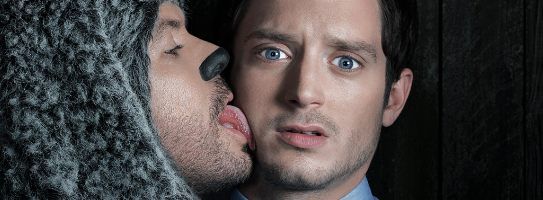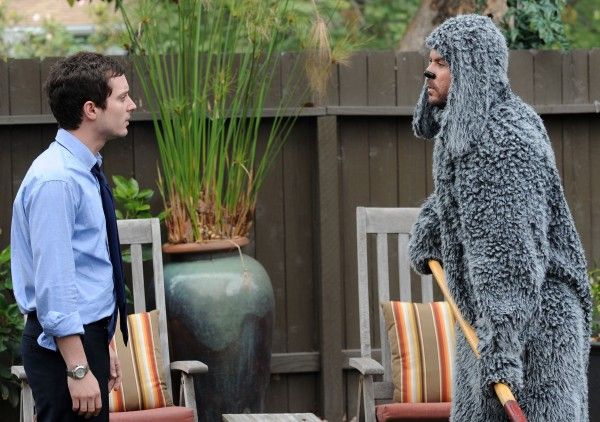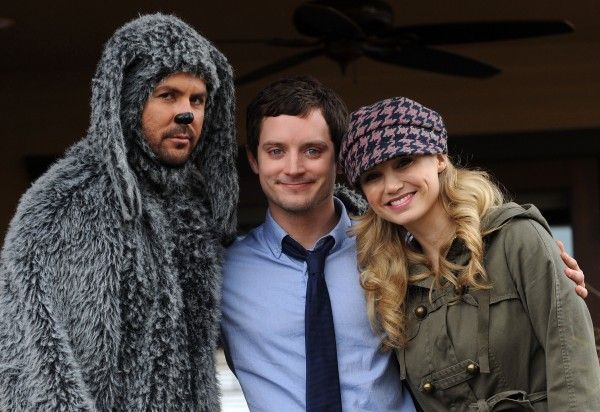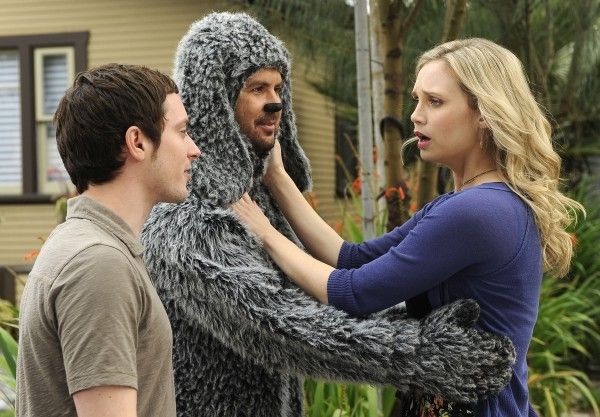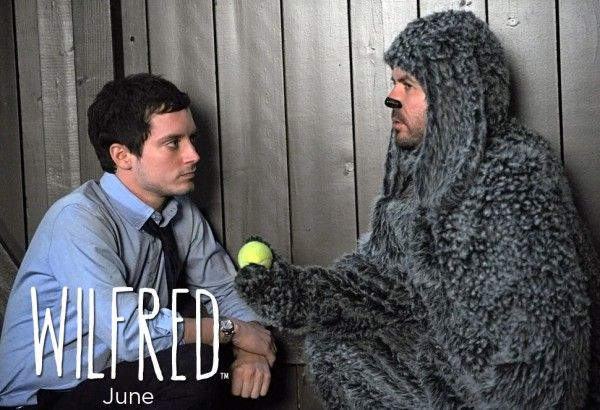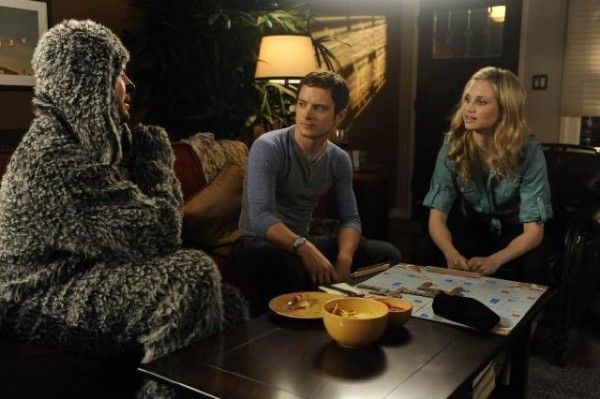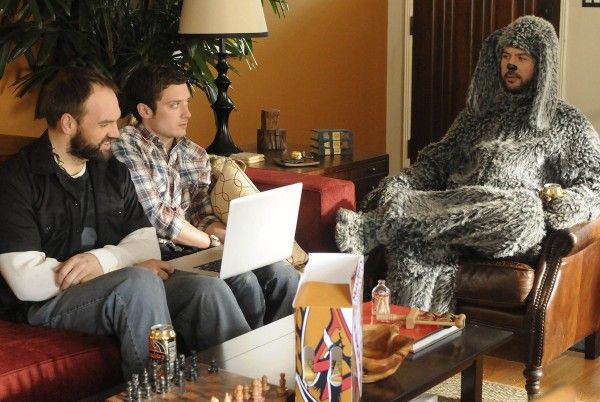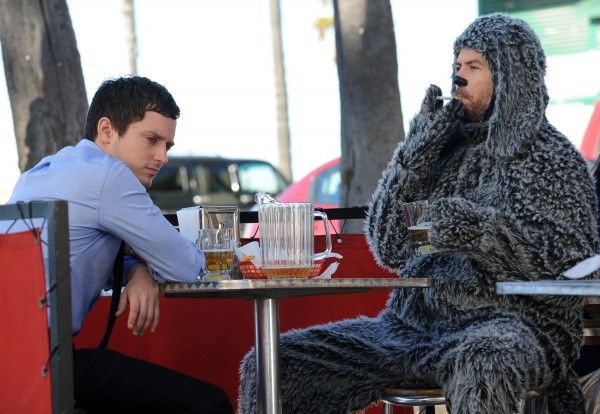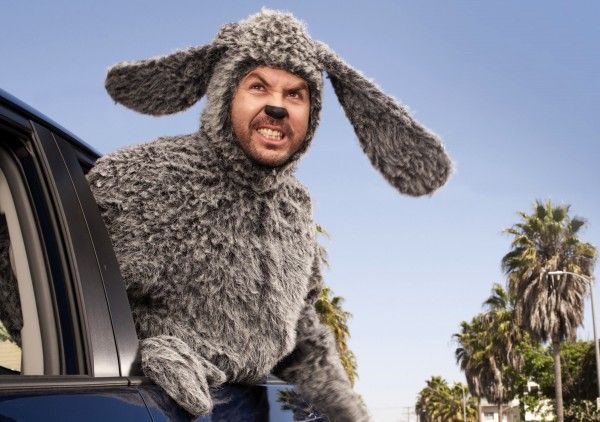Based on the critically acclaimed Australian series of the same name, the FX dark comedy series Wilfred has struck a chord with audiences, far beyond the expectations of everyone involved, and already earned itself a second season. The half-hour shows follows Ryan (Elijah Wood), a young man struggling unsuccessfully to make his way in the world. In a deep depression, he forms a unique friendship with Wilfred (Jason Gann), his neighbor’s canine pet who everyone else sees as just a dog, but who Ryan sees a crude Australian guy in a cheap dog suit.
After leading Ryan through a wide array of trials and tribulations, and the wildest of adventures, Season 1 comes to a close on September 8th, bringing up more questions about Ryan’s mental state than ever before. Co-stars Elijah Wood and Jason Gann (who is also co-executive producer) talked about the Season 1 cliffhanger, where they can take things in Season 2, what they would like to include on the DVD, the possibility of seeing things through Wilfred’s eyes, the struggles they’d like to see Ryan overcome, and how gratifying the success of the show has been. Check out what they had to say after the jump:
Question: Will the season finale wrap up the questions of Season 1, or will it have a cliffhanger?
JASON GANN: I don’t know how much we can say. Let’s just say that there will be more questions than answers. It’s a lot less packaged than the rest of the season. The episodes normally start with a problem that gets somewhat resolved by the end. But, now that we’ve really created the rules and the parameters of the show, we’re able to stretch those a little bit and play with the form more, so it’s a little less packaged.
Jason, in terms of what you set out to do, how do you think things have gone with the American remake, over the course of the season, in terms of meeting or surpassing your expectations?
GANN: It has surpassed my expectations. (Executive producer) David [Zuckerman] had a really good idea for the genesis of this version of the show. I was really excited by it. The ending is pretty tremendous. I’m really looking forward to seeing where we can take that, in Season 2. It’s been good for the show, but it’s also been great for my character, as well. I’ve had a lot of fun with Wilfred, and I think that he has expanded. There are a lot more layers to Wilfred that I didn’t foresee, but I really love. It’s been great fun for me, on the set.
What would you like to see on the Season 1 DVD?
ELIJAH WOOD: There are deleted scenes, some of which I was a real fan of. There is actually a great deleted scene that I won’t reveal because it will likely be on the DVD, that is from the mother episode, and it’s quite hilarious. There also has to be a fair amount of bloopers.
GANN: I’m more aware of what I really don’t want to be on there. I watch the making of movies, but at the same time, I wish they weren’t there, especially if it’s a really fantastic movie that’s got a magical element to it. It’s very rare that I get transported into another realm by TV because I’m so desensitized by being on set all the time. On the rare occasion that I am drawn into that world, I often don’t like seeing how different things are made. I’m not a big fan of behind the scenes stuff. I like interviews. I think we should do interviews. And, I like bloopers. We do have a lot of extra stuff that unfortunately had to be cut because of time. Hopefully, that will be in there and people can get to see some alternatives. There may be a few scenes that are a bit more stretched out, that we didn’t have the benefit of time with.
Since most of the show is through Ryan’s eyes, will viewers get to see any episodes through Wilfred’s eyes?
GANN: No, but you just gave me a great idea for an episode. Thanks. Will we see through Wilfred’s eyes? We may do that. Right now, the formula seems to be working for us. The beginning episodes require a trust, but we’re going to run out of those, eventually. There are only so many different human emotions before we start repeating ourselves.
When you have a series like this, that’s based on such a specific concept as humanizing a dog, do you have any instincts or openness to things that you could do throughout the seasons?
GANN: Yes, we have. I don’t want to shoot our load too early, but we’ve already talked about some stuff that is along those lines. David Zuckerman comes from a great long history of animation, and that’s something that I’d be really interested in exploring, in the show. Maybe if we do go through Wilfred’s eyes, it should be black and white.
WOOD: I like the idea of playing with the format and toying with the audience, to a certain degree. The show is about perception, and that that can also fit into various interpretations of what perception is.
Can you give some insight into the therapy aspect of Wilfred and Ryan’s relationship?
WOOD: The foundation of the relationship is based on the recovery of Ryan. For Wilfred to exist, Ryan has to need him, so that component will always be there, but I think it will ebb and flow. Over the course of this season, we’ve seen Ryan start to recover. I think that dynamic will continue to exist. I feel like it has to exist for that relationship to play out because ultimately it’s about Wilfred engaging Ryan in a way of life that he was unfamiliar with, and ultimately trying to push Ryan to live a stronger, better life. I definitely see that progressing.
GANN: We needed to set up a comedic premise first. Because we’ve done that now, I think we’re able to afford ourselves some space to be able to deal with some heavier things. I don’t think we could do that throughout every episode, but I suspect that the second season might be somewhat similar because anyone that is in recovery, in real life, doesn’t spend their whole 24 hours a day in recovery, otherwise they’re not recovering very well. Part of recovery is to be able to enjoy your life. So, I think that there will be a lot more funny, one-off episodes that don’t hit as hard on the head with the whole therapeutic element, but it will always be there.
What struggle would you like Ryan to overcome, and what role would you like Wilfred to play in it?
WOOD: I suppose that one of his larger issues is being able to socialize with other people. That’s something that I would like to see him overcome. We’ve addressed that, but it failed.
GANN: What I’d like to see Ryan overcome would actually probably mean the end of the show, and then I’d be unemployed, so I don’t really want to see it. But, I’d like to see him not need Wilfred anymore. I imagine that you’d probably see him sitting on a hill with a real dog, and that would be sad, but it’d be good for the character. Whether I want to see that in the show, I don’t know. A really strong side of recovery is when the individual is not aware that they’re recovering, and they’re actually just living their life day-to-day, without thinking about it. I’d like to see Ryan have some periods where he’s actually doing okay, and he and Wilfred are just buddying around, getting into hi-jinks.
WOOD: I’d also like to see Ryan get to work. He’s a lazy ass. We’ve never seen him in a work setting and with other responsibilities. His responsibilities, thus far, have really been about himself, and sorting himself out. To throw him into the context of a working environment, where he has to answer to other people, would be the next step for him. I would like to see that.
What was it like to work with Mary Steenburgen?
WOOD: Actually, working on that particular episode was one of the more enjoyable experiences, made all the more special because of Mary. She was truly extraordinary and brought such a beautiful energy to the set. We only worked with her for four days, but we felt this great loss when she left us. It was amazing. It was four days, but she’d made such an impression on everyone. It was an important episode, in the sense that it gave a lot of background information for the Ryan character, and a really interesting relationship develops between Wilfred and Ryan’s mom, as well.
GANN: Yes, and I got to make out with Mary. I was so excited about making out with Ted Danson’s missus that it overshadowed the rest of the episode for me. We shot a number of takes of that kissing scene. It was a lot of fun. She was a really good sport. We have to bring her back. We really want to see that character again. It was so great that we got a second season, and our fingers are crossed that she’ll be back.
WOOD: It was a great episode, too, in the sense that it explored some of the psychological background to the Ryan character, developing his backstory a little bit. It was an interesting, multi-layered episode that we’re really proud of. And, the make-out is a stellar, very important piece to the puzzle that we created.
With Ryan’s mother seeing the cat (played by Rhea Perlman), how much is Ryan’s ability to see Wilfred tied to his genetics?
GANN: We met the mom in Season 1, and we’re really excited about getting into the dad in Season 2 because it’s been touched on a number of times that Ryan was pushed into a certain direction by his father. Once we get to know the dad, it may shed new light on the mother.
WOOD: I don’t know that I want to believe that that moment at the end of that episode answers all of the questions, either. If anything, I think it indicates that Ryan and his mother are certainly cut from the same cloth. Potentially, it indicates that there’s a history of mental illness that may have been passed down, but I don’t know. I think it provides yet another question. It certainly indicates that there’s a similarity between the two. I love that moment. I thought that was really quite brilliant to include. That was wonderful.
Will viewers find out in future episodes whether anyone else can really see Wilfred?
WOOD: I think the expansion of the world that they’re in is going to be something that we’ll continue to play with. Right now, we’ve traversed this world in the confines of Ryan’s environment, but I think we’ll start to expound upon the outer limits and reaches of that in the second season, and play with it a little bit more.
Are you trying to tell a moral story with each episode, or is it just coincidence that some life lesson is being presented?
GANN: There’s enough chaos and blood and craziness in the world, for anyone. With anything I do, I’m likely to put some moral story in there.
You guys seem to get away with a lot of jokes that are very off-color and very funny, but that you would never see on network TV. Has there ever been anything that the network fought you on?
GANN: They’re pretty open, I’ve got to say. There was one idea we loved that got push back, but we’re going to try and repackage it and try to get it across the line, so I better not explain what it is. But, we do push the envelope. It’s interesting for me because there is a lot of stuff that I could get away with in Australia that we just couldn’t get away with here, and there is stuff that we can get away with here, that I just think, “Are you serious?” There are racist jokes that we’ve made. I’m really careful. I’m really aware of hurting people, and I really don’t like hurting people. I like pushing the envelope and doing adventurous comedy and new types of comedy, but I don’t think we need to necessarily hurt people to do that.
WOOD: I agree with that. The things that we’ve gotten away with that I have been surprised about were some of the more sexual aspects of the show, particularly the sexual montage between Wilfred and the giraffe. I honestly thought that Standards & Practices was going to cut some of that down, but they did not, much to our surprise and appreciation.
GANN: Yeah. It’s funny what I can get away with in a dog suit and what I can’t. There have been things where we’ve debated in the writer’s room, and I’ve said, “We can do this,” and then David [Zuckerman] said, “There’s no way. We aren’t going to be able to do that.” There are certain things you can get away with with animation that you can’t get away with live-action. When I’m in that dog suit, it’s somewhere in the middle. I am actually able to get away with a lot more things than if I wasn’t in that dog suit.
Elijah, what have you learned from the process of television and developing a character over a longer period of time?
WOOD: The process of television is much faster, so in some ways, I wasn’t prepared for the pace. I’d never worked at that kind of pace before. Just simply trying to get six to eight pages of dialogue prepared for each day of work became complicated. Outside of that, the idea of developing a character over the course of a season was very enjoyable. I like keeping an eye on where the character is going. We are ultimately making a comedy series, but we are also looking at how that character is developing and growing and progressing, over the course of the show. I found it not unlike that of a film, but definitely more expansive because we’re dealing with a much larger piece of time. As an actor, I could pay attention to the character, emotionally and psychologically, while also paying attention to what was happening comedically. I found that balance really fun. I think this is a really multi-layered show, and these are real characters. Even Wilfred has his own growth. He is very much rooted in his own reality.
Are you surprised by how successful the show has been here?
GANN: I don’t want to sound arrogant, but no, I’m not surprised. You spend years making shows, and you think that they all should be like that and, all of a sudden, one is and you just go, “Well, great, people are starting to get it.” It’s always difficult when you want to do something really new, and you also want it to reach the masses, because the majority of people want to see what they’ve already seen before, or that they’re already familiar with. To open the majority of peoples’ minds to something new is difficult. I always think that, as long as it’s funny underneath, then you can argue that a teaspoonful of sugar helps the medicine go down. You can maybe be artistic and really original and creative, but as long as it’s got that funniness at the root of it, then certain people are going to love it just because they need a laugh. Most people like to laugh.
WOOD: You work in a bubble on something, so you lose perspective as to what other people are going to think about it, and you have your own perspective as to what it is. We were working in the bubble making this, and we were really excited about what we were doing. It felt like we were doing something unique and different, and a bit strange. I was surprised that people seemed to get it so quickly. We didn’t have any perspective as to what an outsider would think. I remember when we first spoke to some press who had seen the pilot, they immediately got it, and that was extremely gratifying. It’s really found an audience quite quickly, and that people are enjoying it, no only on a comedic level, which I is very easy to do because it is really funny, but also because they seem to really get what else it is, and the multiple layers that it has. People are asking questions and theorizing. One of the most exciting aspects of its success is that people are watching it for all of the different things that it embodies. That, to me, is the most gratifying.
With the finale setting up a number of cliffhangers, have you thought about how Season 2 will pick up? Will there be a time jump, or anything like that?
GANN: With the cliffhanger and how that’s going to resolve, I’m just leaving that in David’s hands. He’s the brainiac who sets up those cliffhangers.
Whether it be TV or film, what do you look for, when reading scripts and deciding which projects you want to do?
GANN: I don’t get that many scripts. Back in Australia, I’ve pretty much done my own shows and really no work outside of that. It’s only now that I’m starting to read some Hollywood film scripts, and I’ve read some really great ones. I like doing roles that I can do in my own way, so it’s pretty tough. I see something that seems like standard fare, that I can imagine any number of actors playing, and I’m generally not interested.
WOOD: I think I’m always looking for something very different from anything I’ve done. I’m attracted to a great script, and not necessarily a great character. Sometimes you can find great characters in the context of a script that aren’t as interesting. I’m almost as interested in just being part of an entire piece that I think is brilliant, even if it’s a small part to play. I’m just always looking for something that I’ve never done, or something that feels unique and special. A lot of it is gut and what you emotionally connect with, and that can be a variety of different things.

